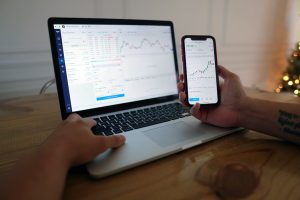STP/ECN Forex Brokers: Everything You Need to Know
In the world of forex trading, there are different types of brokers available, each with their own unique features and characteristics. One of the popular types of brokers is STP/ECN forex brokers. These brokers offer direct access to the interbank market, allowing traders to trade with institutional liquidity providers without the intervention of a dealing desk. In this article, we will explain what STP/ECN forex brokers are, how they work, their advantages, and their disadvantages.
What are STP/ECN Forex Brokers?
STP stands for Straight Through Processing, while ECN stands for Electronic Communication Network. STP forex brokers are those that process traders’ orders without any intervention of a dealing desk. This means that the broker simply acts as an intermediary between the trader and the liquidity providers. The orders are routed directly to the interbank market, where they are matched with counterparties who are willing to take the other side of the trade.
ECN forex brokers, on the other hand, use an electronic communication network to connect traders with liquidity providers. This network aggregates the prices from different liquidity providers, allowing traders to access the best bid/ask prices available at any given time. ECN brokers also offer a depth of market (DOM) feature, which displays the number of orders at different price levels, allowing traders to see the market depth and make informed trading decisions.
How do STP/ECN Forex Brokers Work?
STP/ECN forex brokers operate differently from market maker brokers, which act as counterparties to their clients’ trades. Instead, these brokers connect traders with liquidity providers, such as banks, hedge funds, and other financial institutions. The orders are executed based on the best bid/ask prices available in the market, with the broker taking a small commission or markup on each trade.
STP/ECN forex brokers use different types of execution models, including market execution, limit execution, and stop execution. Market execution means that the order is executed at the current market price, while limit execution means that the order is executed at a specified price or better. Stop execution means that the order is executed only when the market reaches a specified price level.
Advantages of STP/ECN Forex Brokers
STP/ECN forex brokers offer several advantages over market maker brokers. First, they provide direct access to the interbank market, which means that traders can access institutional liquidity and trade at the best bid/ask prices available. This also means that traders can benefit from tight spreads, as the broker does not add any markup to the prices.
Second, STP/ECN forex brokers offer transparency and fairness in their pricing and execution. Since the orders are executed based on the best bid/ask prices available in the market, there is no conflict of interest between the broker and the trader. This means that the broker does not profit from the traders’ losses, as is the case with market maker brokers.
Third, STP/ECN forex brokers offer a high level of speed and reliability in their execution. Since the orders are routed directly to the interbank market, there is no delay in the execution process. This means that traders can benefit from fast and accurate order execution, which is crucial in a fast-paced market like forex.
Disadvantages of STP/ECN Forex Brokers
STP/ECN forex brokers also have some disadvantages that traders need to be aware of. First, these brokers may charge a commission or markup on each trade, which can increase the overall trading costs. This means that traders need to factor in these costs when calculating their profits and losses.
Second, STP/ECN forex brokers may have higher minimum deposit requirements compared to market maker brokers. This means that traders need to have a larger initial capital to open an account with these brokers.
Third, STP/ECN forex brokers may not offer as many trading instruments as market maker brokers. This means that traders may not have access to some of the exotic currency pairs, CFDs, or other trading instruments that are available with market maker brokers.
Conclusion
STP/ECN forex brokers offer direct access to the interbank market, allowing traders to trade with institutional liquidity providers without any interference from a dealing desk. These brokers offer transparency, fairness, and speed in their pricing and execution, which can benefit traders in a fast-paced market like forex. However, they may also have some disadvantages, such as higher trading costs, higher minimum deposit requirements, and limited trading instruments. Therefore, traders need to carefully consider their trading needs and preferences before choosing an STP/ECN forex broker.






